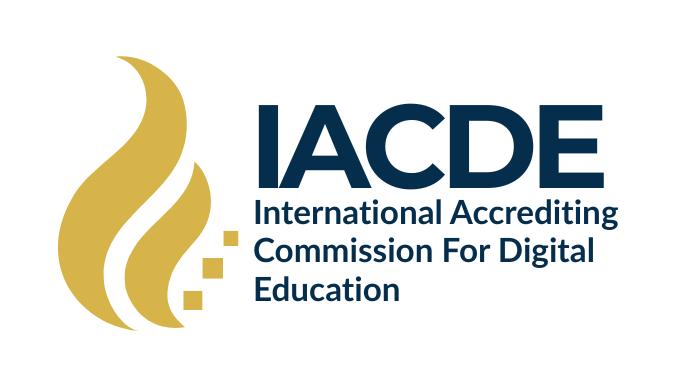As education increasingly shifts to virtual and hybrid delivery, digital accreditation is now essential for ensuring that online schools, universities, and training academies are recognized, credible, and trusted. Whether you’re a startup edtech platform, a faith-based microacademy, or an established virtual college, understanding how to get accredited online is key to growing your reach and reputation.
What Is Digital Accreditation?
Digital accreditation is the process of evaluating and formally recognizing institutions that primarily deliver education through online or hybrid platforms. This includes:
- Online universities and colleges
- K–12 virtual academies
- Faith-based institutions
- Microcredential and coaching programs
- Edtech platforms offering modular learning
Unlike traditional accreditors who focus on in-person site visits and static seat-time models, digital accreditors like IACDE evaluate the quality, integrity, and outcomes of institutions in a 100% virtual environment.
Why Online Accreditation Matters in 2025
1. Students Need Trusted Institutions
With the surge of digital learning, students are increasingly asking:
“Is this online program accredited?”
“Will this credential be recognized?”
Digital accreditation assures learners that the institution is:
- Academically rigorous
- Student-centered
- Transparent and ethical
- Aligned with international standards
2. Institutions Need Recognition
Online providers often struggle to qualify for traditional accreditation, especially those offering:
- Competency-based programs
- Modular certifications
- Coaching or skills-based credentials
- Faith-based learning models
Digital-first accreditation bodies like IACDE offer legitimate pathways to recognition without compromising innovation.
3. Governments & Employers Demand Standards
In a post-COVID world, ministries of education and employers want clear quality indicators for virtual institutions. Accreditation is no longer optional—it’s a requirement for legitimacy, especially for institutions in emerging markets or cross-border programs.
“To ensure student success, quality assurance systems must evolve to evaluate virtual and remote learning effectively.”
— EDUCAUSE Review, 2020
What Makes a Digital Accreditor Different?
| Traditional Accreditation | Digital Accreditation (IACDE) |
|---|---|
| In-person site visits | 100% virtual peer evaluations |
| Paper-based documentation | Secure cloud-based submission |
| Seat-time metrics | Competency-based learning support |
| Regional scope | Global reach and remote flexibility |
Who Should Pursue Digital Accreditation?
Digital accreditation is ideal for:
- Online universities and colleges
- Faith-based training academies
- Virtual K–12 and adult schools
- Coaching & wellness certification programs
- Edtech platforms with microcredentials
- Institutions in Nigeria, Ghana, India, the U.S., and beyond
Whether you’re just starting or scaling globally, online school accreditation adds trust and legitimacy to your educational offering.
How to Get Accredited Online with IACDE
Getting started is simple:
- Submit an application outlining your institution and programs
- Complete a virtual self-study guided by IACDE’s standards
- Participate in a peer evaluation conducted online
- Receive recognition and digital accreditation status
“Digital accreditation with IACDE is designed to be transparent, achievable, and globally aligned—without compromising academic integrity.”
Further Reading
Council for Higher Education Accreditation (CHEA). (1998). Assuring Quality in Distance Learning.
Read the full paper (PDF)
EDUCAUSE Review. (2020). 5 Tips for Moving from Remote Instruction to Quality Online Learning.
Read online
UNESCO. (2024). Common Framework for Digital Transformation in Education.
Read on UNESCO
Read online



Comments are closed